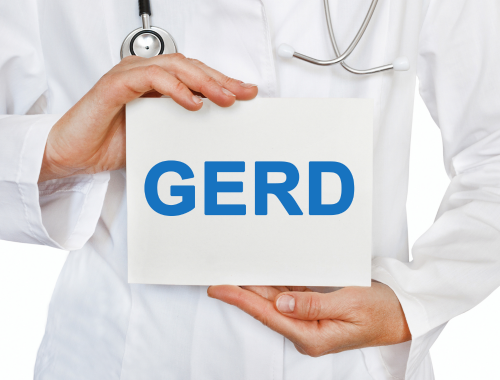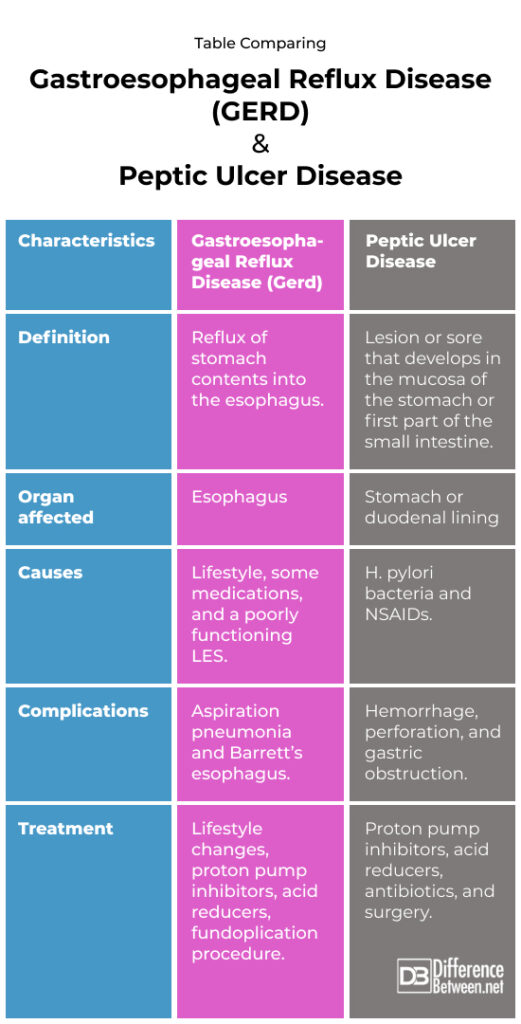Difference Between Gastroesophageal Reflux Disease (GERD) and Peptic Ulcer Disease
Gastroesophageal reflux disease is a condition where the acidic contents of the stomach move back up into the esophagus. Peptic ulcer disease is when ulcers form in the stomach or duodenal mucosal layer.

What is Gastroesophageal reflux disease (GERD)?
Definition:
GERD is when acid from the stomach refluxes back up into the esophagus.
Causes:
GERD can be caused by certain medicines, like aspirin, and by eating a large meal. Drinking certain beverages that contain caffeine can also cause GERD. GERD can happen because the lower esophageal sphincter (LES) does not close properly and is affected by what you eat and drink.
Symptoms:
The most frequent sign of GERD is heartburn. There can also be regurgitation of stomach contents, vomiting, and anorexia.
Complications:
Complications of GERD include aspiration of stomach contents leading to aspiration pneumonia where patients may cough and wheeze. Barrett’s esophagus may also develop as a result of repeated episodes of GERD.
Diagnosis:
A physical exam and endoscopy can help diagnose the condition. Sometimes patients may also undergo pH testing to determine if there is acid being refluxed into the esophagus.
Treatment:
A change in diet and beverages can help, so avoiding coffee and not eating close to bedtime is helpful. Medications that are proton pump inhibitors are helpful. Examples of such medicines include lansoprazole and omeprazole. Surgery in the form of fundoplication is an option in some cases.

What is Peptic ulcer disease?
Definition:
Peptic ulcer disease is when one or more sores develop in the gastric or duodenal mucosa.
Causes:
The mucosa of the stomach or small intestine can become eroded because of infection by the bacteria, Helicobacter pylori, or due to overuse of nonsteroidal anti-inflammatory drugs (NSAIDs).
Symptoms:
Peptic ulcers can be in the stomach (gastric ulcers) or in the duodenum (duodenal ulcer). The symptoms are slightly different depending on where the ulcer is located. In many cases, there is pain in the top area of the stomach. This is sometimes relieved by using antacids or by eating. Patients may be nauseated, bloated, and vomit. The duodenal ulcers are often more painful and awaken patients at night.
Complications:
The main complication of peptic ulcers is bleeding. The patient may vomit blood or pass blood in the stools. Bleeding can be dangerous and lead to shock and death. Perforation can also occur through the stomach or duodenum wall. This can result in stomach contents spreading into the abdomen, causing damage and infection. Gastric obstruction can occur in some cases as a complication of peptic ulcers; this may require surgery to correct.
Diagnosis:
Diagnosis is by physical exam and an endoscopy. The endoscopy can show the presence of sores in the stomach or duodenum. A biopsy can also be done at the same time, which is important to rule out stomach cancer.
Treatment:
Treatment may depend on the cause. Antibiotics can be used to eradicate H. pylori bacteria. Acid blockers and proton pump inhibitor medications can be used. Surgery is only sometimes done to correct the problem if medicine does not work. Surgery does have many high risks, though, making this a last resort.
Difference between Gastroesophageal reflux disease (GERD) and Peptic ulcer disease
Definition
GERD is defined as a condition when there is a reflux of stomach contents and acid back into the esophagus. Peptic ulcer disease is when lesions or sores develop in the gastric or duodenal mucosa.
Organ affected
GERD affects the esophagus. Peptic ulcer disease affects the stomach or duodenum.
Causes
GERD can be caused by lifestyle factors and having a dysfunctional LES. Peptic ulcer disease is caused by H. pylori bacteria or the use of NSAIDs.
Complications
Complications of GERD include aspiration pneumonia and Barrett’s esophagus. Complications of peptic ulcer disease include hemorrhage and perforation.
Treatment
Treatment of GERD includes lifestyle changes and using proton pump inhibitors, acid reducers, and a fundoplication procedure. Treatment of peptic ulcer disease includes Proton pump inhibitors, acid reducers, antibiotics, and surgery.
Table comparing Gastroesophageal reflux disease (GERD) and Peptic ulcer disease

Summary of Gastroesophageal reflux disease (GERD) Vs. Peptic ulcer disease
- Both GERD and peptic ulcer are unpleasant digestive system problems.
- GERD can sometimes be managed with lifestyle changes.
- Peptic ulcers can often be treated with medication, and sometimes antibiotics.
FAQ
Is GERD also an ulcer?
No, GERD is not an ulcer, instead it is the discomfort one feels when acid from the stomach backs up into the esophagus.
How can you tell the difference between a gastric ulcer and a peptic ulcer?
Gastric ulcers are peptic ulcers that occur in the stomach. Peptic ulcers can occur either in the stomach or in the duodenum of the small intestine.
What doctor treats GERD or ulcer?
The best doctor to consult and treat GERD or an ulcer, is a gastroenterologist, a doctor that specializes on the gastrointestinal system.
What are the warning signs of stomach ulcer?
The most common symptom is a burning sensation in the stomach, but bloating, indigestion, nausea, and vomiting may occur as well.
What can happen if a stomach ulcer is left untreated?
A stomach ulcer can worsen resulting in massive bleeding or perforation of the stomach. Complications can lead to death.
What foods soothe an ulcer?
Foods high in fiber like oatmeal and fruits like pears and apple can have a soothing effect.
What is the first stage of stomach ulcer?
The first symptom is pain and the first stage of a developing stomach ulcer is a yellowing appearance to the stomach lining.
- Difference Between Rumination and Regurgitation - June 13, 2024
- Difference Between Pyelectasis and Hydronephrosis - June 4, 2024
- Difference Between Cellulitis and Erysipelas - June 1, 2024
Search DifferenceBetween.net :
Leave a Response
References :
[0]Holloway, Richard H., and John Dent. "Pathophysiology of gastroesophageal reflux: lower esophageal sphincter dysfunction in gastroesophageal reflux disease." Gastroenterology clinics of North America 19.3 (1990): 517-535.
[1]Lynch, Kristle Lee. “Gastroesophageal reflux disease (GERD)”. Merckmanuals. Merck & Co., 2022, https://www.msdmanuals.com/professional/gastrointestinal-disorders/esophageal-and-swallowing-disorders/gastroesophageal-reflux-disease-gerd#
[2]Vakil, Namish. “Peptic ulcer disease”. Merckmanuals. Merck & Co., 2022, https://www.msdmanuals.com/professional/gastrointestinal-disorders/gastritis-and-peptic-ulcer-disease/peptic-ulcer-disease
